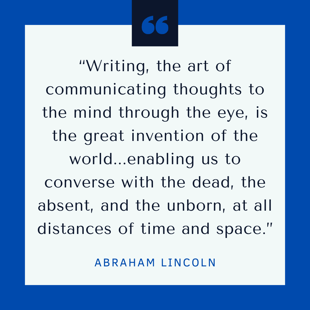 A Case for Useless Degrees
A Case for Useless Degrees
“You have a degree in English. You’re not going to be able to find another job,” the CEO said.
It was 2007. I’d graduated from college and hadn’t immediately become a best-selling author with minimal effort. After taking a few minutes to recover from that shock, I applied for a job at a financial services company in their auto insurance line.
I worked there for two months before my then-husband received a sudden, permanent change of duty station, out of state. (Military spouses have notoriously abysmal unemployment rates, and this is a perfect example of why.)
After several months of searching, I landed a temp job at a beauty manufacturer as an executive assistant. The pay was as depressing as the atmosphere. You know the vocational honeymoon season followed by a slow-growing awareness that you’re being boiled alive? The honeymoon was approximately 30 seconds long. I felt a strong impulse to plow into a ditch every morning as I drove to work.
Once I’d had my job responsibilities changed about eight times in the same number of weeks, observed a churn rate of about 70%, and had my car vandalized by a disgruntled coworker, I decided to move on.
The CEO was aghast. “I’ll pay you more money!” he almost hollered.
“Thank you but no.”
“The agency doesn’t need to know about it!” His eyes bulged.
“I’m not interested in breaching my contract with them.”
“You can’t be serious!” he answered.
I looked steadily at him.
“You have a degree in English,” he said, as if “English” were a dirty, disgraceful thing. “You’re not going to be able to find another job.”
“Insulting me is a pretty poor way to go about convincing me to stay,” I answered before walking out of his office.
Sometimes people say, “That’s so cool!” when I tell them I’m a writer/that I studied English on purpose. Sometimes they react like the CEO, as if I chose a degree in stripping for retirement centers. There seems to be no middle ground on this subject—only utter respect or complete disdain.
I sort of understand the ambivalence. On the one hand, you have:
- a degree that isn’t tied to a specific job or industry
- a field of study for something we’re all already doing, akin (at a glance) to a degree in digesting food
- fiction writing as a career only viable for a percentage of a percentage of writers
- the inability to do the most obvious thing (teach English) unless your degree is actually in English education
On the other hand, you have:
- a degree that informs/supports/expands any job in any industry
- a plethora of jobs directly related to writing to choose from (editor, proofreader, writer (of any/every genre), spoken word artist, songwriter, screenwriter, playwright, ghostwriter, content writer, copywriter, journalist, marketer, PR specialist, etc.)
- a skill/hobby that can be done on the side for money or giggles
- the ability to run away from schoolchildren screaming, “No, I won’t explain ‘gerunds,’ you monsters!”
The only point I wish to linger over is “a degree that informs every job in every industry.” And not just for the sake of my pouty 22-year-old ego.
Our society, relationships, sense of self, financial security, restaurant patronage, use of technology, political activity, legal standing, ability to conceptualize and create, and, yes, our jobs, all rely on the ability to communicate—to understand and express ourselves in language.
Learning how to wield language as effectively as a knife—to pare, to divide, to group, to discard, to dissect—is the power to influence a person, a judge, an electric company, an employer review board, a customer base, and even an entire nation.
Imagine Abraham Lincoln standing before the crowd at Gettysburg and saying, “Hey, ya’ll. I’d like to take these two minutes to tell you that I didn’t prepare for this speech because English is lame, and I don’t like this war. Whatever. Can’t we all just get along? Now, who wants to see me shimmy?”
Just 272 words spoken in a “shrill and unpleasant” voice* in 1863 were credited with “a new birth of freedom.” That intentional influence isn’t reserved for politicians or historical figures.
My takeaway: Don’t underestimate the power of useless degrees and effective language. (And don’t stick around people who use insults to increase your loyalty.)
*****
Thanks for reading! We post a new writing guide, spelling quiz, or grammar tip every other week. Be sure to subscribe to our email updates to get them delivered to your inbox. Use the search bar at the top-right of our blog to learn more about specific topics.
Can’t find answers to a grammatical head-scratcher that’s driving you batty? Post a comment below or submit a question directly to our grammar experts. We may even create a new resource or blog post with the answer!



